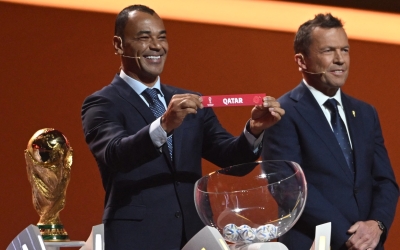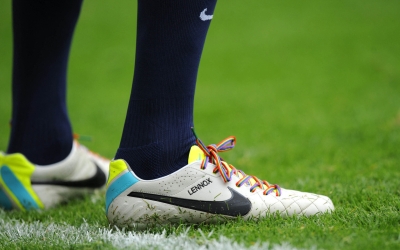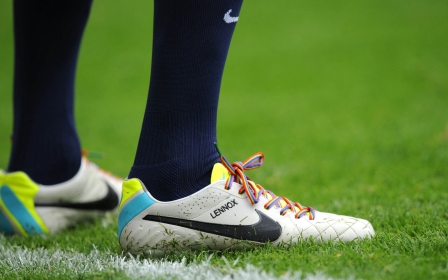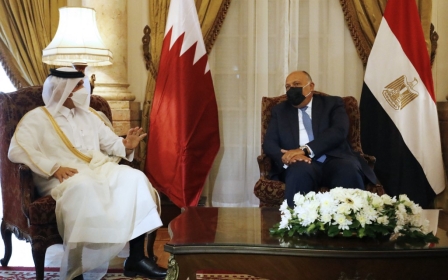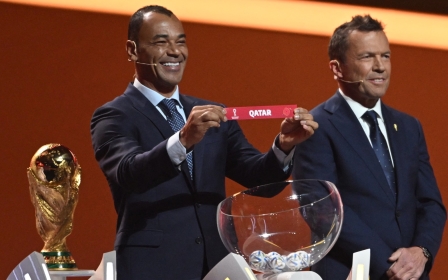Qatar World Cup: Security guards 'subjected to forced labour' ahead of tournament

Security guards in Qatar are working in conditions which amount to forced labour, including on projects linked to this year's Fifa World Cup, according to a report published by Amnesty International on Thursday.
In the investigation, entitled "They think that we’re machines," the UK-based organisation documented the experiences of 34 current or former employees of eight private security companies in Qatar.
'Imagine working a 12-hour shift then being driven to the training centre, then you do training for eight hours. All night'
- Zeke, security guard for Fifa Club World Cup
Amnesty said it had not named the companies due to the risk of high-profile clients terminating their involvement at short notice.
At least three of the companies have provided security for Fifa tournaments, including the 2020 Fifa Club World Cup (which was postponed to 2021) and the 2021 Fifa Arab Cup.
The security guards, all migrant workers, described routinely working 12 hours a day, seven days a week – often for months or even years on end without a day off.
New MEE newsletter: Jerusalem Dispatch
Sign up to get the latest insights and analysis on Israel-Palestine, alongside Turkey Unpacked and other MEE newsletters
Most said their employers refused to respect the weekly rest day which is required by Qatari law, and workers who took their day off anyway faced being punished with arbitrary wage deductions.
'Four hours sleep'
Zeke, from Uganda, worked at the Fifa Club World Cup in February 2021.
He told Amnesty International how he had to complete a week-long training session in preparation for the tournament. The eight-hour training took place immediately after his regular shift each day.
“Imagine working a 12-hour shift then being driven to the training centre, then you do training for eight hours. All night," said Zeke.
"Then you report to work at 5am – you get four hours sleep and you train the whole week. They think that we’re machines.”
Amnesty said that while Fifa and the Qatar World Cup Supreme Committee, which organises the tournament, did not renew the contracts of two of the three companies, "neither body provided sufficient detail to assess whether this disengagement was carried out responsibly, transparently and as a last resort".
"They compounded this failing by not identifying and addressing abuses in a timely manner," said the rights group.
"As a result, both bodies benefitted from these companies' services while abuses were taking place."
Amnesty also found that four of the companies in the report are still not paying overtime at the rate required by law, meaning they are in some cases cheating guards out of hundreds of riyals – sometimes as much as eight days’ pay – each month.
'Abuses are systemic'
Amnesty said the consistency of the accounts given to it by security staff across multiple companies "indicates that these abuses are systemic".
Stephen Cockburn, Amnesty International's head of economic and social justice, said: "Despite the progress Qatar has made in recent years, our research suggests that abuses in the private security sector - which will be increasingly in demand during the World Cup - remain systematic and structural.
"With the World Cup just months away, Fifa must focus on doing more to prevent abuses in the inherently perilous private security sector, or see the tournament further marred by abuse, [and] use its leverage to pressure Qatar to better implement its reforms and enforce its laws. Time is fast running out."
In response to Amnesty’s allegations, Qatar’s Ministry of Labour acknowledged that “individual cases of wrongdoing need to be dealt with immediately”.
However, it disputed that these signify “underlying issues with the robust system Qatar has introduced”, and stated that “the prevalence of rule-breaking companies has and will continue to decline as enforcement measures take hold and voluntary compliance increases among employers”.
The World Cup Supreme Committee said that irrespective of regulations or monitoring systems, some contractors will always try to “bypass the system”.
It went on to confirm its commitment to address and rectify breaches. Fifa provided background information but did not respond to Amnesty’s allegations.
LGBTQ+ concerns
Critics have previously pointed to Qatar's human rights record as a reason why the World Cup, which will be held in November and December, should not be staged there.
Qatar has been accused of failing to investigate the deaths of thousands of migrant workers over the last decade, many involved in the construction of World Cup stadiums, despite widespread evidence of a link between premature deaths and unsafe working conditions.
On Friday, LGBTQ+ supporter groups from across the world accused both Fifa and the organisers of the World Cup of ignoring their concerns for members of the community attending the tournament later this year.
The eight groups, including Wales' Rainbow Wall, England's LGBTQ+ fan group Three Lions Pride, the Independent Supporters Council North America, and Football Supporters Europe issued the statement the same day that the draw for the tournament took place.
The statement said both Fifa and the World Cup Supreme Committee had failed to adequately prove that members of the LGBTQ+ community would be safe at the World Cup.
Middle East Eye delivers independent and unrivalled coverage and analysis of the Middle East, North Africa and beyond. To learn more about republishing this content and the associated fees, please fill out this form. More about MEE can be found here.


